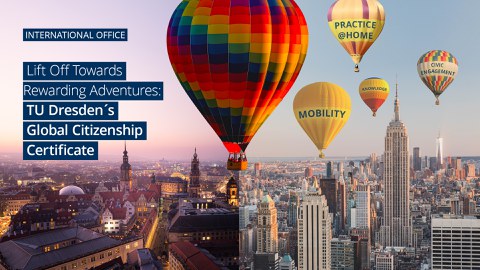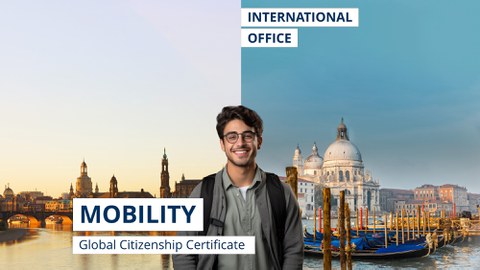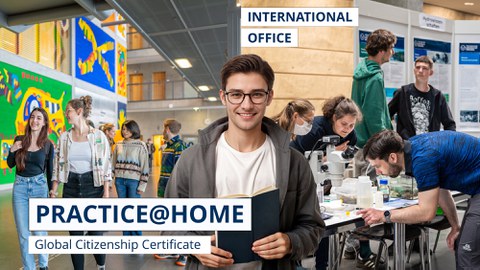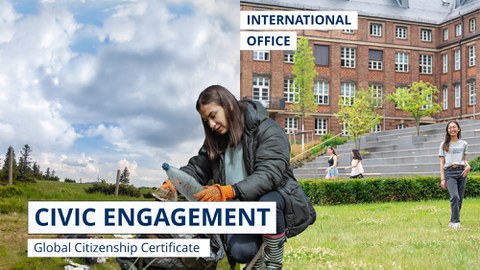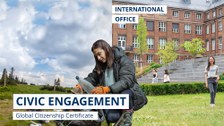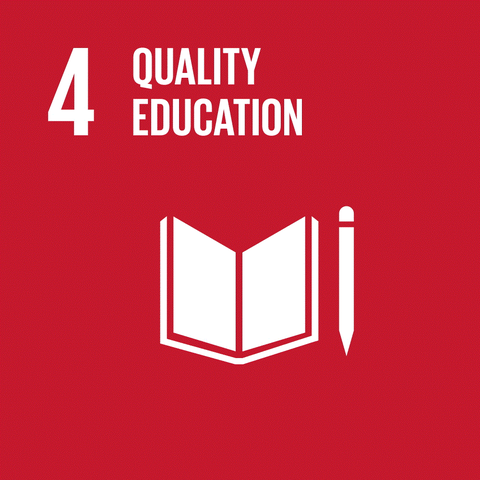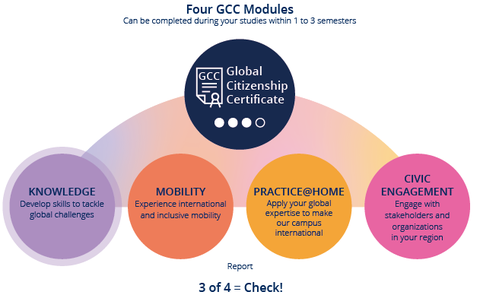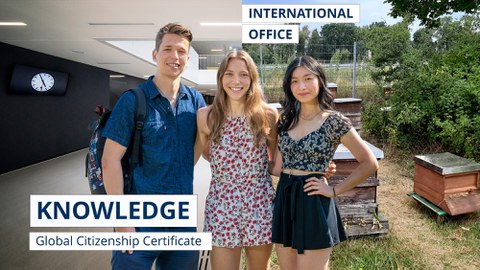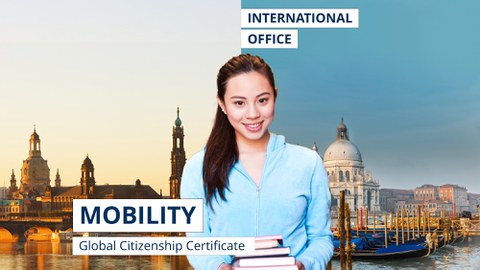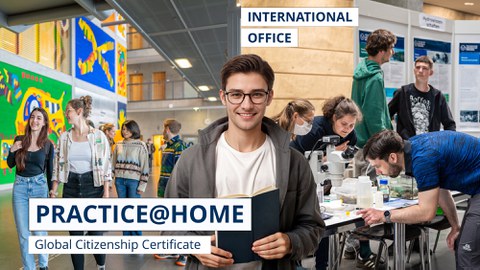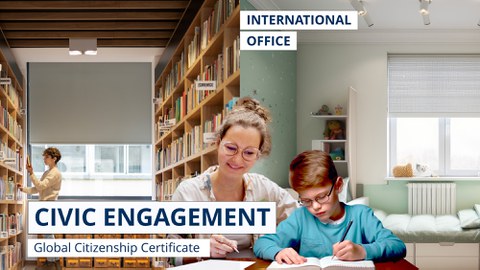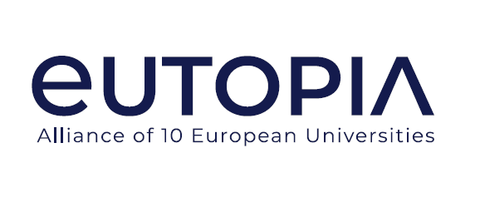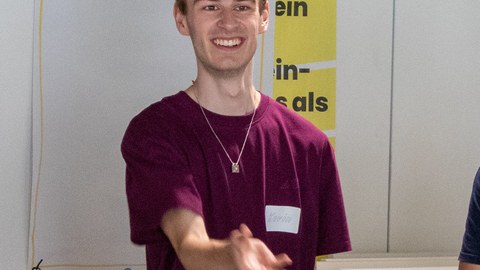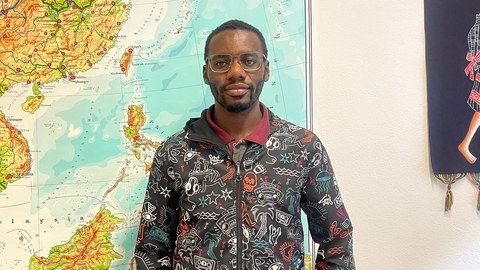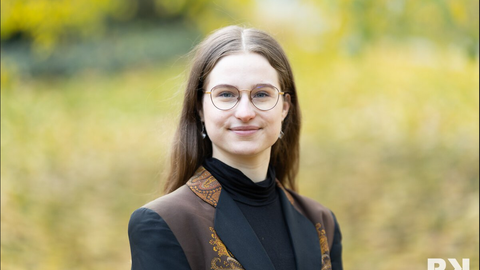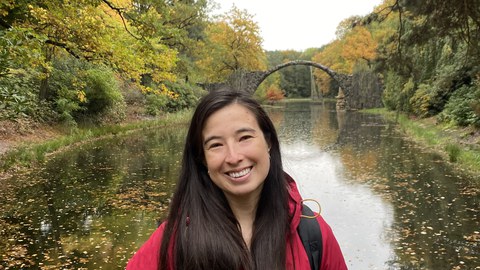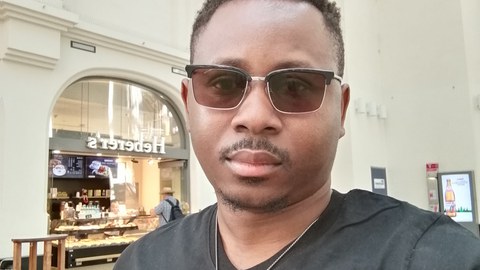TUD Global Citizenship Certificate
Table of contents
Stay engaged with the world – become a Global Citizen
The TUD Global Citizenship Certificate (short: GCC) qualifies, empowers, and connects you to a diverse and global-minded scientific and civil community.
GCC rewards your intercultural and global experiences, competencies, and your local-global commitment in the form of a significant and promising certificate, issued in the name of the University Executive Board.
Developed by TU Dresden's International Office in the Internationalization@Home department, GCC aims to intensify institutional internationalization, expand the intercultural and global competencies of the TUD members, and boost the international campus. All students enrolled at TU Dresden (including doctoral and exchange students) who intend to leverage their knowledge, improve their skills, and help shape the local global community actively and reflectively, are welcome to participate in the GCC program.
By attending the GCC program, you will join a committed, connected, and visible community, supported by numerous local and international stakeholders and experts. In this community, you can gain inspiration and support on your very own path to becoming a future global citizen.
How GCC impact your future
GCC is a key contribution by TU Dresden towards the implementation of Sustainable Development Goal 4, also known as Agenda Education 2030, coordinated by UNESCO. Within this framework, Global Citizenship Education (GCED) is a sub-goal that aims to ensure inclusive and equitable quality education and promote lifelong learning opportunities for all.
The TUD Global Citizenship Certificate certifies that you have – in addition to your academic studies – acquired knowledge and skills to understand global challenges in an interdisciplinary, holistic way, as well as within their ethical dimensions, and you are able to embrace them in a committed and competent manner. GCC educates, supports, and networks you so that you can develop a sense of belonging to the global community on the campus and in the urban society, play an active role in shaping it, and contribute constructively to a more peaceful, just, diverse, and sustainable world.
With GCC as an experience, qualification, and award, you are well equipped for your personal growth, your self-efficacy in an international and global environment, your academic success in the broadest sense, and a strong and mindful future career!
About the structure of GCC
GCC consists of four modules: Knowledge, Mobility, Practice@Home and Civic Engagement.
To obtain the certificate, you need to complete at least three of the four modules, with the Knowledge module being compulsory. You can choose any two of the other three modules. If you have already completed all three modules, you need to compose a short reflection report. After all this is done, your personal TUD Global Citizenship Certificate will be issued with the signature of a member of the University Executive Board which certifies and distinguishes your knowledge, commitment, skills, and experience as a TUD Global Citizen.
The four modules of the GCC
For this module, you will learn with a focus on knowledge and skills. You need to complete two of three components. Please combine Knowledge 1 with Knowledge 2 or 3.
Note for international students and scholarship holders: Relevant courses within your exchange or scholarship program at TU Dresden (e.g. events via the DAAD scholarship program) can be credited.
Component knowledge-1 (compulsory)
Introduction to Global Citizenship Education and Engagement: It addresses diverse issues e.g. "global challenges", "societal responsibility and participation", "education for sustainable development (ESD)", "inter- and transcultural competencies", "communication and conflict skills", "diversity and inclusion", "democracy education","resilience" and "mental health".
- Compulsory introductory seminar: TUD Global Citizenship Lab (two-day block course; offered every semester; compulsory) current information on the GCC website and registration via Studium Generale and registration on OPAL
Note: If you didn't receive a place for the current introductory seminar, you can be put on the waiting list for the next semester. For this, please contact the TUD GCC team.
component knowledge-2
Learning and qualification in relevant subject areas, skills and competencies
You have the following options:
- Seminars/Lectures (min. 2 SWS): courses of subject-specific and interdisciplinary qualification can be credited, such as relevant courses within the program of Studium Generale, Studium Oecologicum, Regional Studies at the Center for East-Asia Studies, Regional Studies Latin America, and at the Writing Center of TU Dresden, as well as single courses within and beyond the subject-specific studies such as Environmental Ring Lecture of the tuuwi, lecture series SustainAbility: Understanding and Implementing Sustainability from the Green Office and Gender Lectures.
OR
- Intensive formats such as workshops, trainings, summer schools, and further education (at least 16 units / 2 days) such as Global Health Initiative Spring/Winter School, relevant educational offers on key competencies at Career Service as well as within the qualification program of the Graduate Academy.
Component knowledge-3
Expand your language skills, promote multilingualism
- Completion of language courses or other language learning formats for English, and German as well as other foreign languages (at least 2 SWS), e.g. via Language Training TU Dresden (TUDIAS) based on the Unicert system, in the areas of DaF and DaZ studies, and within the Regional Studies Regional Studies at the Center for East-Asia Studies, Regional Studies Latin America.
For the module, we recognize your physical, hybrid, or virtual experience abroad – via an exchange program, by completing a study program abroad (for international students), or as a free mover. You need to accomplish one of two components.
Note for international students: Your study, research, or guest stay at TU Dresden can be credited for the mobility module. This means that you could have already fulfilled the requirements for this module.
Component mobility-1
A longer stay abroad (at least 4 weeks)
You have the following options:
- Study abroad (semester or year abroad)
- Internship abroad
- Research stay
Component mobility-2
Two or more short mobility formats (total of at least 2 weeks, additive)
You have the following options:
- Blended Short Term Mobility, e.g. via ERASMUS Short Term Blended Mobility
- International summer school (e.g. SEASON OF EXCELLENCE - Dresden Summer Schools), excursion or short research stays (e.g. Short-term programs worldwide), hybrid and virtual programs can be treated equally but need individual assessment
- Relevant simulation games, competitions organized by the UN, EU and professional associations, virtual/hybrid
- Virtual exchange in teaching and learning formats: Courses abroad or at TU Dresden with well-designated components of "Virtual Exchange" or "Collaborative Online International Learning" (in the teaching concept) and participation of international partners such as EUTOPIA Connected Communities, at least 1 semester or as a comparable intensive block event, also virtual/hybrid
- Other (case-by-case assessment!
For your stay abroad (as well as at TU Dresden in the case of international students) you can find information on the following pages:
International Office of TU Dresden (contact persons)
Stay abroad (e.g. ERASMUS, PROMOS, TUDWELTWEIT, Taiwan - Semiconductor Talent Incubation Program, Swiss-European Mobility Program (SEMP))
Internships abroad (e.g. Leonardo Office Saxony)
International regional ambassadors of TU Dresden
Cultural Office of the TU Dresden
International tutoring program of the TU Dresden
Scholarships for applicants and students from abroad
Information for doctoral students: For advice and funding opportunities please check this relevant website of the Graduate Academy.
In this module, you will receive credit for your commitment and practical assignments with a focus on the international campus organized by TUD and EUTOPIA organizational units. The minimum amount is 30 hours.
Your engagement should have an international, intercultural, diversity-related and/or local-global reference, reflect the topics and values of Global Citizenship Education (GCED) and demonstrate the implementation of your knowledge, skills and competences as a prospective TUD Global Citizen in practice.
For examples of engagement opportunities organized by TUD and EUTOPIA organizational units, you can use this list* as a guide.
The Practice@Home module includes the possibility to (co-)organize student teaching. If you take part in organizing a student teaching event as part of this module, you can apply for funding from the Incentive Fund Equality and Diversity if the topic is suitable. As a student teacher, you can also be nominated for the Award for diversity-sensitive teaching, which is endowed with annual prize money of €10,000 from the Excellence Strategy of the federal and state governments. TUD's Diversity Management also offers the opportunity to receive a budget for the organization of barrier-free events.
*Note: the list is only an example and does not claim to be complete or up to date. Furthermore, we have no political or similar connection with the listed initiatives and are not obligated to their programs.
In this module, you will receive credit for your involvement outside TU Dresden and in local civil society. The minimum amount is 30 hours.
Your engagement should have an international, intercultural, diversity-related and/or local-global reference, reflect the topics and values of Global Citizenship Education (GCED) and demonstrate the implementation of your knowledge, skills and competences as a prospective TUD Global Citizen in practice.
Here you will find a list of example areas (constantly updated):
- Involvement in the numerous initiatives, associations, institutions, facilities (schools, neighborhood meetings, child and youth welfare, retirement homes, refugee aid, etc.) in Dresden's urban society and region as well as nationwide, with an international, intercultural, diversity-related and/or global thematic focus
- Active participation in topic-relevant and practice-oriented projects (e.g. service-learning offers in the field of sustainability and civic engagement such as the learning-through-engagement format praxiSDG and elbMUN Conference - Model United Nations Dresden)
- Participation in local, regional and national university groups with an international, intercultural, diversity-related and/or global focus (e.g. TU Dresden university groups and TU Dresden university groups (recognized by the StuRa))
- Commitment to the transfer of knowledge to society (e.g. science podcasts, science blogs, science slams)
For examples of civil society initiatives and organizations for your commitment, you can use this list* as a guide.
*Note: the list serves only as an example and does not claim to be complete and up to date. Furthermore, we have no political or similar connection with the listed associations and initiatives and are not obligated to their programs.
Languages of communication
To involve all participants, the GCC events will be conducted at a multilingual level in German and English, complemented by additional languages of the participants. We embrace a diversity of cultures and languages, and are ready to explore new ways of communication with you.
How to apply for the certificate?
Who can participate?
All students, doctoral candidates, and exchange students enrolled at TU Dresden (local, national, and international) can participate in the GCC program. The registration, recognition, and issuing of certificates are free of charge.
When and how to register?
You can register for the TUD GCC program at any time by using your ZIH login during your undergraduate, postgraduate, and doctoral studies. During your studies, you can manage your schedule and individual pace to fulfil the requirements for the certificate. We recommend that you invest at least two semesters to complete the certificate.
If you have already fulfilled certain components of the certificate before the enrollment, these can be recognized retrospectively (depending on the module, in some cases back to the start of your studies). All certificates must be submitted no later than one year after the completion of your studies in order to obtain the TUD Global Citizenship Certificate.
The introductory seminar (TUD Global Citizenship Lab) takes place every semester and is mandatory. It is up to you to time your attendance. However, we recommend participating as early as possible to get a good orientation and join a supportive network of like-minded and committed people from TU Dresden and local civil society.
The Global Citizenship Lab took place on June 28 and 29 at the COSMO Science Forum Dresden. The Lab is part of the TUD Global Citizenship Certificate (GCC) program. © TUD/ZLSB/IO
Are you in? Then register for the program here. With your program registration, you can subscribe to our e-mail newsletter and stay up to date.
Is GCC credit-bearing?
You can gain credit points for your successful participation in the above-mentioned GCC introductory seminar, currently offered via Studium Generale. Please check your study regulations regarding credit transfer (e.g. in the AQUA area) and speak with your Examination Office.
Synergy with EUTOPIA Certificate of Internationalization
Since 2021, TU Dresden has been a committed member of the EUTOPIA University Alliance that pursues the vision of a European campus, preparing European youth for the local and global challenges of the future. This allows you to acquire the EUTOPIA Certificate of Internationalization (EUCI for short) as an additional European certificate.
EUCI recognizes the international experiences and competencies of students from all partner universities. With the guidance of expert tutors, you can reflect on your learning outcomes from different perspectives (personal, academic, professional), and compile a reflective portfolio that can include creative and multimedia elements. You will have the opportunity to broaden your international network by connecting with other EUTOPIA students in a series of virtual seminars.
By completing the modules for the GCC program, you have fulfilled the requirements of EUCI regarding international learning and experiences. All you need to do is to attend the EUCI tutorial and create a reflective portfolio. Enrol now on this free online program to gain formal (but non-credit-bearing) recognition. If you have any questions about the EUCI program, please contact Lewis Beer or the GCC team for a first consultation.
GCC Community and Events
As a future Global Citizen, you are not alone. By joining GCC, you become part of a larger, supportive community and will be surrounded by like-minded peers. In the GCC community, you can make new contacts, gain new insights, pursue common goals, exchange ideas, and reflect with the help of a partner. On top of that, you can learn.
The GCC community can only thrive through the commitment and contribution of its members. Therefore we would like to invite you to help initiate and organize exciting events and activities. We are also looking for your content for the GCC social media channels to liven up the community and make it visible. So it will be great if you can support the GCC community as alumni, inspirers, and mentors after completing the certificate.
The introductory seminar serves as your starting point in the GCC Community. Within the TUD Global Citizenship Lab, you can get to know a group of internal and external experts, inspiring and committed personalities and organizations: in the fields of global citizenship education, global learning, ESD, and civil society engagement. You will get involved and gain valuable insights into various professional and volunteering fields. You can find the review of the last TUD Global Citizenship Lab here.
The team by your side
If you have any questions or suggestions, or are interested in helping to shape the program, please contact the GCC team at TU Dresden. If you need help with registration, we will gladly help and support you!
GCC on social media
Get inspired by the GCC members
Funded by the Federal Ministry of Education and Research (BMBF) and Free State of Saxony under the Excellence Strategy of the Federal Government and the Länder

